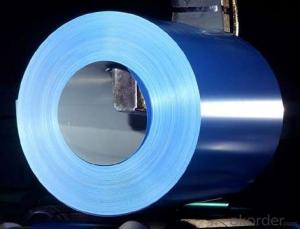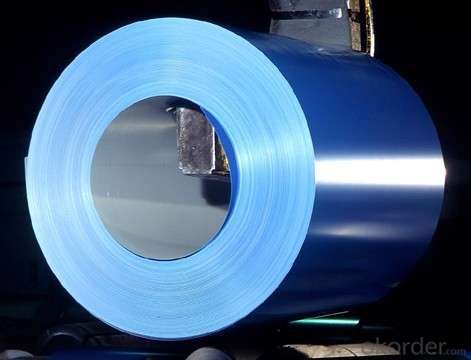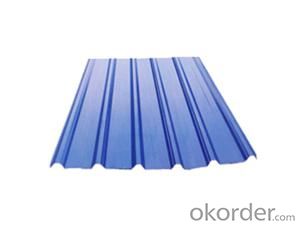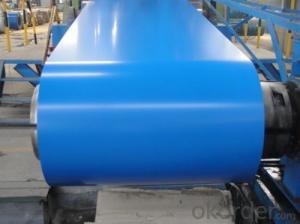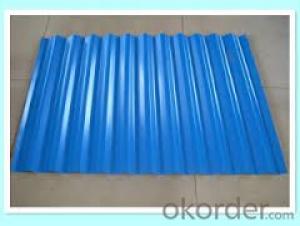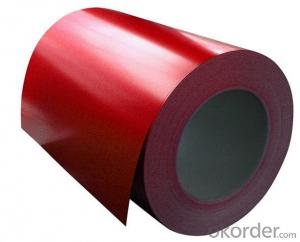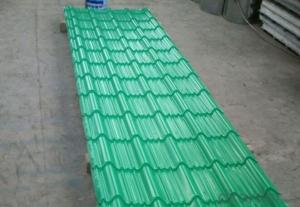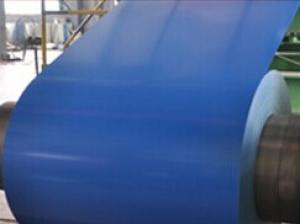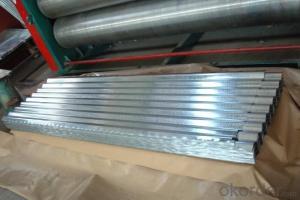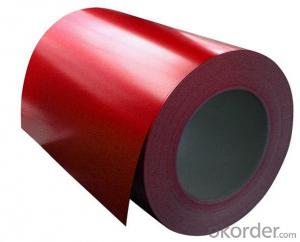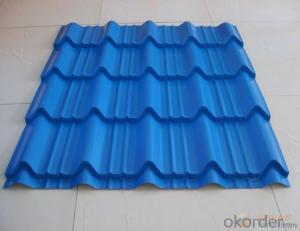Color Coated Galvanized/Aluzinc Steel Coil in High Quality
- Loading Port:
- Shanghai
- Payment Terms:
- TT OR LC
- Min Order Qty:
- 100 m.t.
- Supply Capability:
- 10000 m.t./month
OKorder Service Pledge
OKorder Financial Service
You Might Also Like
1. Pre-Painted Galvanized/Aluzinc Steel Coil Description:
With GI as base material, after pretreatment (degrease and chemical treatment ) and liquid dope with several layers of color, then after firing and cooling, finally the plate steel is called pre-painted galvanized (aluzinc) steel. Pre-painted galvanized steel is good capable of decoration, molding, corrosion resistance. It generally displays superior workability, durability and weather resistance.
2.Main Features of the Pre-Painted Galvanized/Aluzinc Steel Coil:
• Excellent process capability
• Smooth and flat surface
• Workability, durability
• Excellent heat resistance performance
• High strength
• Good formability
• Good visual effect
3.Pre-Painted Galvanized/Aluzinc Steel Coil Images
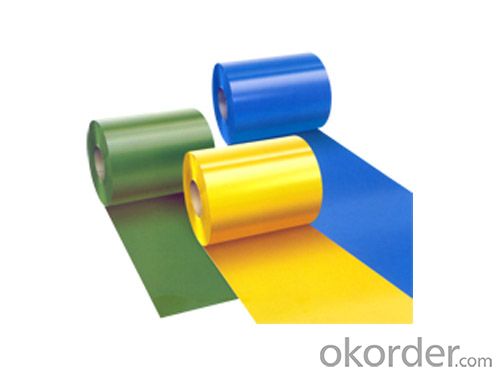
4.Pre-Painted Galvanized/Aluzinc Steel Coil Specification
Standard: AISI, ASTM, BS, DIN, GB, JIS
Grade: DX51D, DX52D
Thickness: 0.17-2.0mm
Brand Name: KMRLON
Model Number: coil
Type: Steel Coil
Technique: Cold Rolled
Surface Treatment: Coated
Application: Boiler Plate
Special Use: High-strength Steel Plate
Width: 20-1250mm
Length: customized
commoidty: pre-painted galvanized steel coil
Thickness: 0.13-4.0mm
width: 20-1250mm
zinc coating: 40-180g/m2
printing thickness: top side: 20+/-5 microns, back side: 5-7 microns
color: all RAL color
surface treatment: color coated
coil weight: 4-7 tons
coil ID: 508/610mm
packaging: standard seaworthy packing
5.FAQ of Pre-Painted Galvanized/Aluzinc Steel Coil
1. What’s the application of this product?
Roof, roof structure, surface sheet of balcony, frame of window, etc.
2. What’s the brand of the paint?
We use the best brand of all of the word—AKZO.
3. How about your company?
A world class manufacturer & supplier of castings forging in carbon steel and alloy steel,is one of the large-scale professional investment casting production bases in China,consisting of both casting foundry forging and machining factory. Annually more than 8000 tons Precision casting and forging parts are exported to markets in Europe,America and Japan. OEM casting and forging service available according to customer’s requirements.
4. How to guarantee the quality of the products?
We have established the international advanced quality management system,every link from raw material to final product we have strict quality test;We resolutely put an end to unqualified products flowing into the market. At the same time, we will provide necessary follow-up service assurance.
5. How long can we receive the product after purchase?
Usually within thirty working days after receiving buyer’s advance payment or LC. We will arrange the factory manufacturing as soon as possible. The cargo readiness usually takes 15-25 days, but the shipment will depend on the vessel situation.
- Q: What are the different types of steel coils available?
- There are several types of steel coils available, including hot rolled coils, cold rolled coils, galvanized coils, stainless steel coils, and coated coils.
- Q: What are the common coil finishes available for steel coils?
- The common coil finishes available for steel coils are hot-dip galvanized, galvannealed, electro-galvanized, and organic coated finishes such as painted or coated with polymer films.
- Q: How can I arbitrate quality of steel before purchasing it??
- The quality of the alloy can be very well be judged by its appearance and lustrous surface. The more luster on the surface the more refine will the steel be. To judge its tenacity and endurance, the alloy can be subjected to a series of procedures involving stress and shock. The reaction to these processes can determine whether the steel be fit for the purpose required.
- Q: Can steel coils be transported by air?
- Yes, steel coils can be transported by air.
- Q: What are the different types of steel alloys used in coils?
- Coils commonly employ various types of steel alloys, each possessing unique properties and characteristics. Some frequently used types include: 1. Carbon Steel: As the most fundamental and widely utilized steel alloy in coils, it boasts low carbon content and renowned strength and durability. Carbon steel coils find extensive application in areas demanding high strength, such as automotive parts, construction materials, and machinery components. 2. Stainless Steel: Comprising an iron, chromium, and other element alloy, stainless steel coils exhibit exceptional resistance to corrosion, formidable strength, and heat resistance properties. They are typically employed in scenarios where shielding against corrosion and staining is pivotal, such as kitchen appliances, medical equipment, and transportation components. 3. Galvanized Steel: Galvanized steel coils are formed by coating regular carbon steel with a layer of zinc, furnishing excellent corrosion resistance and safeguarding the underlying steel from rust. Commonly utilized in outdoor settings like roofing, fencing, and automotive body parts. 4. Alloy Steel: Alloy steel coils are manufactured by incorporating diverse alloying elements like manganese, nickel, chromium, or molybdenum into carbon steel, thereby enhancing the steel's strength, hardness, and wear resistance. These coils frequently find application in industries necessitating high strength and toughness, such as machinery, tools, and construction equipment manufacturing. 5. Electrical Steel: Electrically specialized steel coils are designed explicitly for employment in electrical equipment like transformers and electric motors. These coils possess low electrical resistance and high magnetic permeability, facilitating efficient electricity conduction and magnetic field generation. Typically constructed from a silicon alloy, which enhances electrical and magnetic properties. In conclusion, the selection of a steel alloy for coils hinges upon the specific requirements of the given application, encompassing factors like strength, corrosion resistance, electrical conductivity, and heat resistance.
- Q: How are steel coils used in the production of metal roofing?
- Steel coils are used in the production of metal roofing by being fed through a series of machines that shape, cut, and coat the steel to create the final roofing product. The coils are uncoiled and flattened, then formed into the desired profile using roll forming machines. The formed sheets are then cut into specific lengths and coated with protective layers to enhance durability and corrosion resistance. These coated steel sheets are then packaged and shipped to construction sites for installation as metal roofing.
- Q: How do steel coils compare to aluminum coils?
- Steel coils and aluminum coils possess distinct characteristics that render them suitable for varying purposes. Firstly, steel coils are renowned for their robustness and durability. They can endure high temperatures and exhibit greater resistance to damage in comparison to aluminum coils. Consequently, steel coils are an ideal choice for heavy-duty industrial applications necessitating sturdy materials, such as construction, automotive manufacturing, and the oil and gas industries. Additionally, steel coils boast heightened corrosion resistance, enabling their usage in outdoor environments characterized by harsh conditions. On the contrary, aluminum coils are lighter in weight and possess a higher strength-to-weight ratio than steel coils. This renders them exceptionally well-suited for industries wherein weight serves as a critical factor, such as aerospace and transportation. Furthermore, the malleability of aluminum coils facilitates easier shaping and forming, thereby proving advantageous in industries like packaging and consumer electronics. Moreover, aluminum coils exhibit superior thermal conductivity when compared to steel coils, rendering them more efficient in heat transfer applications. This particular attribute proves beneficial in industries such as HVAC (heating, ventilation, and air conditioning) and refrigeration, where the achievement of efficient heat exchange is of utmost importance. Concerning cost, steel coils generally prove more affordable due to the lower cost of raw materials. However, aluminum coils can yield long-term cost savings as they require less maintenance and possess a longer lifespan owing to their resistance to corrosion. In conclusion, the selection between steel coils and aluminum coils hinges on the specific requirements of the application at hand. Steel coils are favored for their strength, durability, and corrosion resistance, while aluminum coils excel in lightweight applications, heat transfer, and malleability.
- Q: i mean the properties include the elasticity, impact load and ductility. am doing assignment about the perfect material that should be possessed by spring and i found alloy steel is the perfect and am confused whether stainless steel is the same with alloy steel ?
- Is Stainless Steel An Alloy
- Q: How are steel coils used in the production of metal buildings?
- Steel coils are an essential component in the production of metal buildings as they are used to create the structural framework and outer cladding. These coils are unrolled and cut into sheets, which are then shaped and formed into various building components such as beams, columns, and panels. The strength and durability of steel make it an ideal material for constructing metal buildings, ensuring they are capable of withstanding harsh weather conditions and providing long-lasting structures.
- Q: I just want regular steel, not stainless steel.
- Iron is the primary ingredient in steel. All Steel is an alloy by definition. Stainless steels are alloys that resist corrosion. There are dozens of alloys of steel. Many stainless steels are not magnetic. If a magnet won't stick to it it is very likely to be a stainless steel but that is not true for all stainless steels. You really do need to be more specific as to what you want and why. There are too many to chose from.
Send your message to us
Color Coated Galvanized/Aluzinc Steel Coil in High Quality
- Loading Port:
- Shanghai
- Payment Terms:
- TT OR LC
- Min Order Qty:
- 100 m.t.
- Supply Capability:
- 10000 m.t./month
OKorder Service Pledge
OKorder Financial Service
Similar products
Hot products
Hot Searches
Related keywords
